Are you inspired by old monochrome pictures of harmonious-looking flower gardens, particularly blossoms?
Then you would love to interplay minimal yet pristine-looking black and white flowers in your garden and home.
Although not entirely black and white, these flowers often impersonate monochromatic photos with basic yet elegant features.
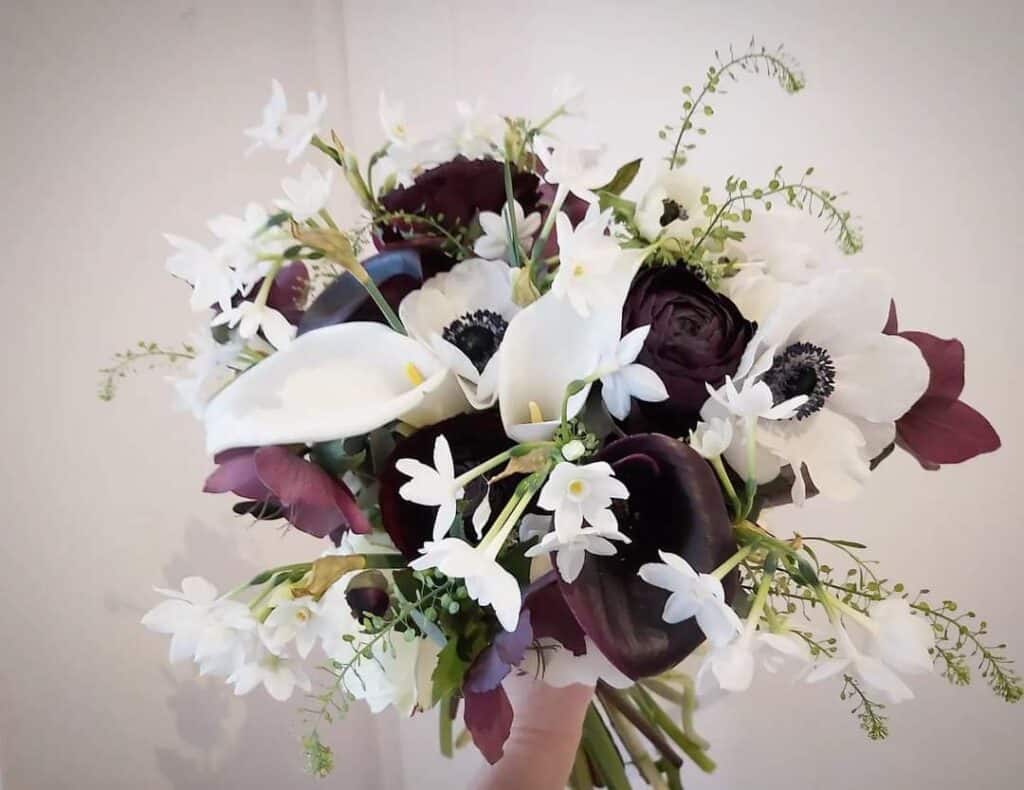
These flower shades resemble the famous Ying and Yang of Chinese tradition, symbolizing the difference between good and evil, making them a unique addition to your home garden.
Read on to find out some of the best black-and-white flower choices and ways to grow them efficiently.
Table of Contents Show
10+ Popular Black and White Flowers
What distinguishes flowering plants are the random blossoms that will pop out with their minimal shades.
Many flowers are richly colored and variegated; hence, adding black and white flowers to the collection will automatically add to the contrast.
Use this interplay of colors by choosing some of these popular elegant black and white flowers.
1. Snowstorm
Snowstorm, also known as Nemophila menziesii’ Snowstorm,’ is a popular annual flowering plant from Western North America.
These make excellent garden plants as they can survive warm and cool climates (USDA Zones 1-10) and thrive in full sun.
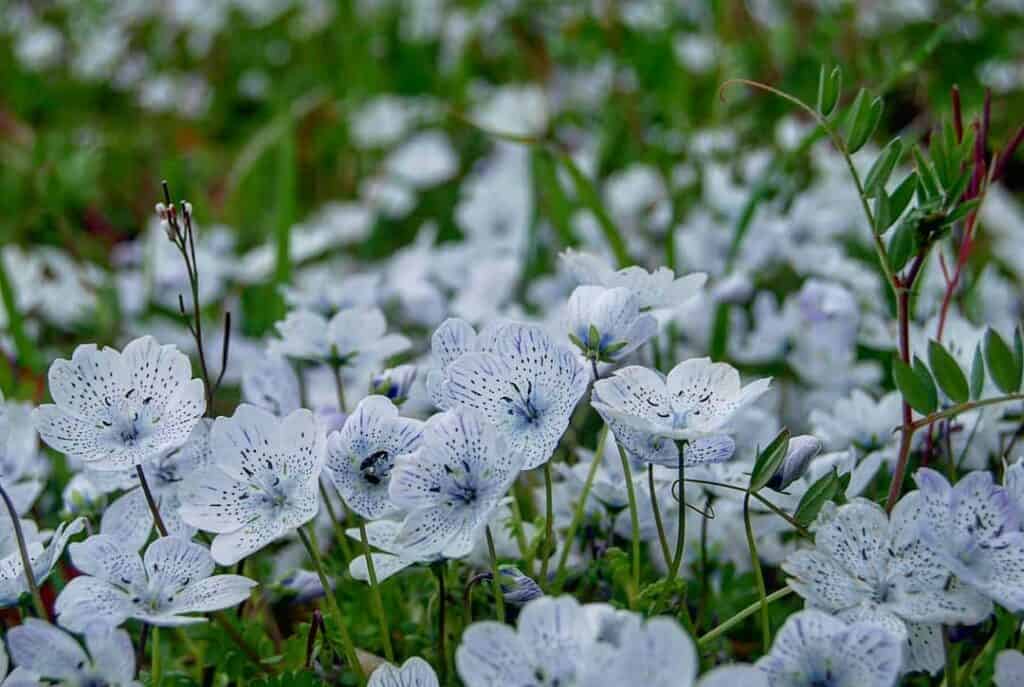
The oval, green leaves with white blossoms at the top make an excellent ground cover plant.
A mature Snowstorm will reach about 4 inches in height and give out symmetrical radial flowers every spring and summer.
Remember, they require cross-pollination to blossom, best done by garden bugs like butterflies and bees.
2. Anemone Carmel White
Also known as Anemone De Caen’ Carmel White,’ these are Mediterranean plants with large, single white flowers with a prominent dark center.
The bright white flowers resemble poppies with a dark center against 5 to 6 white petals.

Care to grow them in USDA zones 7 to 10 with full or partial sun, mild temperature, and ample humidity in the growing season.
When everything goes as planned, Carmel White will reach about 12 inches tall and boast thick green foliage with white flowers.
However, the blossoms are not known to emit fragrance; hence, they would only great ornamental plants.
Furthermore, Anemone Carmel White is a deer-resistant perennial; however, it is toxic to pets and children.
3. Pantaloon Foxglove
Pantaloon Foxglove, also known as Digitalis purpurea ‘Pam’s split,’ boasts uniquely-shaped flowers grown in clusters on a single-rod-like stem.

The flowers grow in cascades, each bell-shaped bud getting a few inches long, attracting pollinators.
Pantaloon Foxglove is a native European plant that can survive in both partial and full sun and blossom for many weeks in late spring or early summer.
A mature plant will reach about 36 to 48″ in height and bloom only in its second year.
4. Lilium Asiatic
Lilium Asiatic or ‘Big-Bang’ Lily produces long-lasting blossoms with six-petals and outward-facing flowers.
Although they mostly grow colorful flowers, seeing monochromatic shade is not rare.

The name Lilium Asiatic comes from the flower Lily and the place of its origin, Asia.
A mature plant will grow up to 3 to 4 feet tall outdoors in full or partial sunlight.
They are also cold, hardy plants that can survive minus-degree temperatures. Remember, the flowers bloom first in early summer, right after peonies.
5. Royal Wedding
The Oriental Poppy’ Royal Wedding’ is a perennial flowering plant from Asia, boasting large flowers.
They will attract all kinds of pollinators, including butterflies.

The Royal Wedding flowers bloom in the spring and go dormant in the early summer, so do not expect them to last longer.
More importantly, plant Royal Wedding flowers in pots so you can move them in the shade when the summer temperature reaches above 90°F.
When grown in the U.S., consider planting them in USDA zones 3 to 7.
6. Phalaenopsis Orchid
Phalaenopsis Orchid, also known as Moth Orchid or White Purple Spot, boasts white flowers spotted with purple spots and a pink lip.
The flowers grow on a single long stem with about fifteen flowers.

They make perfect indoor plants that grow about 12″ tall; therefore, you can grow them in pots kept above chairs or dining tables.
However, remember not to overwater them and provide ample warm temperature and humidity. Most importantly, keep them out of direct sunlight.
7. Rhododendron ‘Sappho’
Rhododendron Sapphos are evergreen shrubs that boast deep green foliage and ornamental flowers.

Did you know they are named after the female Greek poet and muse Sappho?
A mature plant will reach about 6 feet in height but needs occasional pruning to maintain the right shape.
Remember to provide partial shade but strictly avoid dark and damp locations, which will wilt the flowers and stems.
8. Pansy Giant White Black Face
Pansy Giant White Black Face is a perfect flowering plant because each flower boasts white petals with black centers resembling a human face.

However, avoid planting them inside. They are best grown in a garden with warm temperatures and full sun.
A mature plant will reach about 6 to 9″ in height, with its flowers attaining 2 to 3 inches in diameter.
9. Black Widow
Black Widow (Geranium phaeum) is a European perennial plant that boasts dark-colored flowers; hence the name black widow.
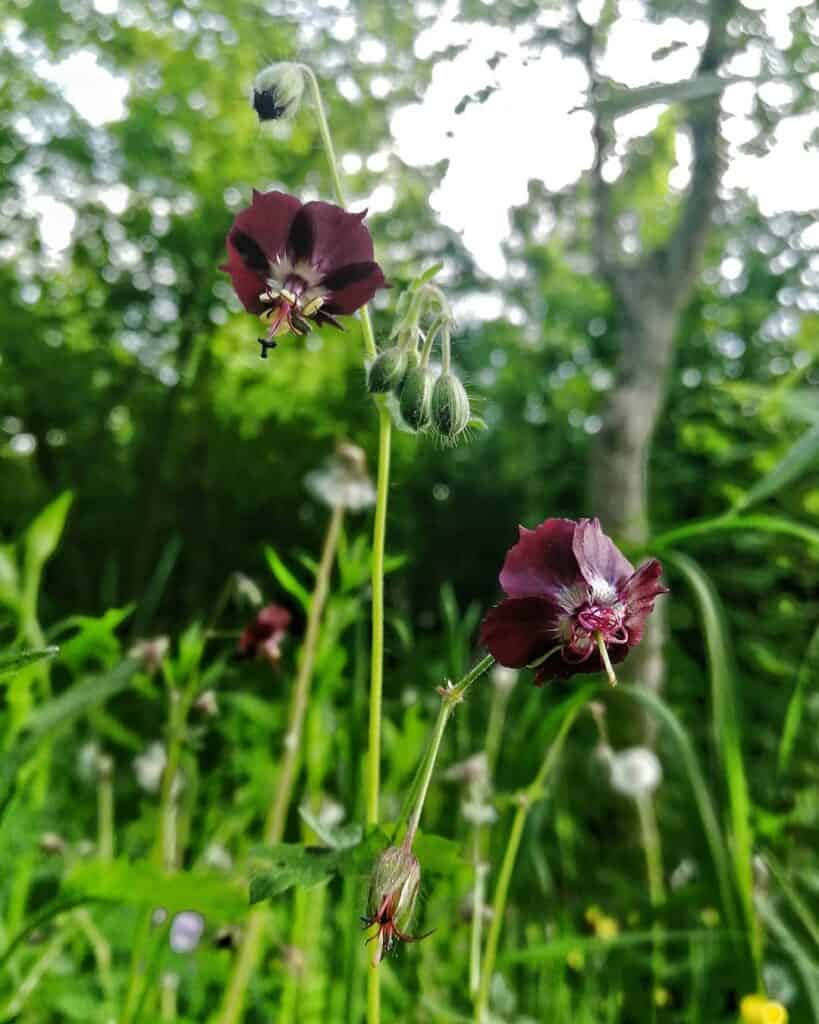
The plant can grow quite tall and dense, with a mature plant reaching 24 to 36″ in height.
Grow them in the garden where they can get full sun with mostly partial shade throughout the day. As the flowers blossoms in spring, they will attract plenty of butterflies.
10. Crazytunia Black and White
Crazytunia Black and White flowers grow in large clusters, giving them an impression of a bouquet plant.
It is often cited as a new variety of Crazytunia that gives out black and white flowers.
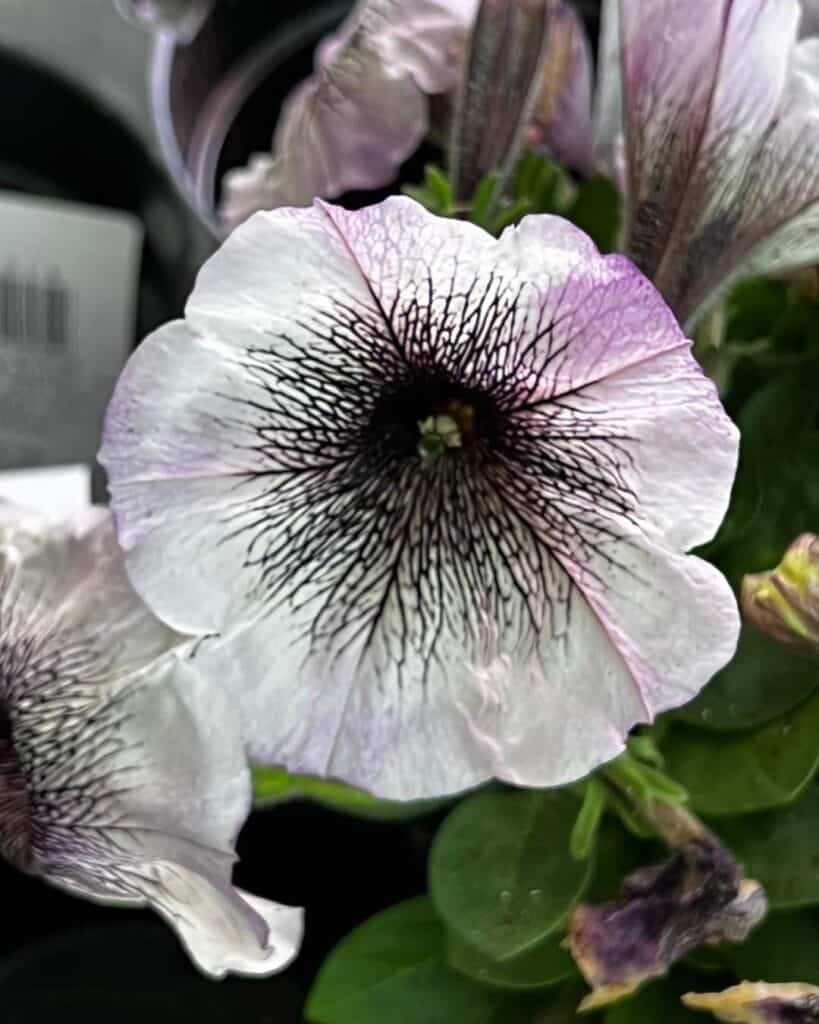
The dark veins often emerge from the center, giving a rich contrast to each flower.
However, remember they prefer full sunlight and do not survive in soggy soil conditions.
Other than that, they are easy-to-grow and low-maintenance plants that will thrive in your home garden.
11. Dahlia
Thanks to their large, colorful blossoms, Dahlias are America’s favorite flowering plants.
Most Dahlia species boast pink flowers; therefore, finding Dahlia with white and black flowers may be rare.
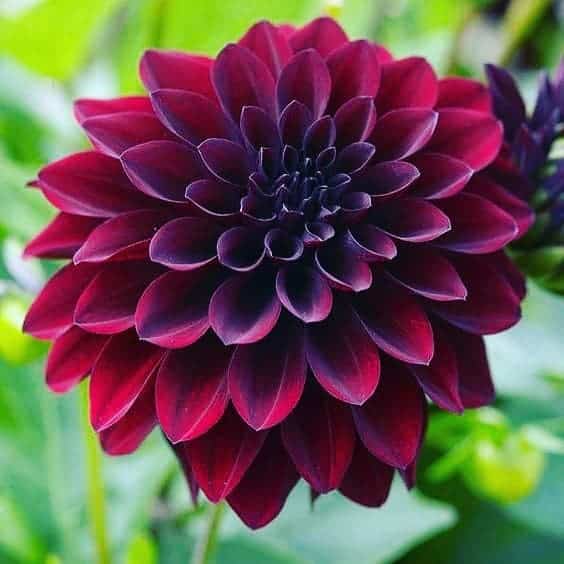
Remember, these are not frost-hardy plants; they will drop flowers in fall and winter.
Keep them in a well-light location in the garden that receives 6 to 8 hours of sunlight and invites pollinators.
They are best grown in groups, as each plant will benefit from a single pollinator.
10 Additional Black and White Flowers
The list of gorgeous black and white flowers does not end here.
Here are a few other famous black-and-white flowers you can grow at home or in gardens.
| Varieties | Features | Image |
|---|---|---|
| Penny Black | 1. It is a popular American annual plant that grows about 4-6" and boasts stylish little flower with violet petals and white outer edges. 2. Provide them with full sunlight. |  |
| Pyrus pyrifolia ‘Shinseiki’ | 1. It is a fruit bearing plant that also boasts a profusion of white flowers and dark center. 2. It will reach about 250 cm in height and grows best in full sun. |  |
| Petunia hybrida | 1. It is a popular petunia variety from 35 species found worldwide. 2. Also known as 'Night Skies,' it adorns white flowers with rich specks of purple and blue. |  |
| Flower of an Hour | 1. Also known as Hibiscus trionum, it gives out creamy white flowers with a dark center and yellow anthers. 2. It will reach about 4-5 feet tall when grow in full sunlight. |  |
| Asian Pear Flowers | 1. Asian Pear Flower is a dessert cultivar that boasts five-petal white flowers with dark tips. 2. It grows best in full sun with well-drained and fertile soil. |  |
| False Shamrock | 1. Oxalis triangularis is a South American perennial that boasts large foliage growing in three leaves. 2. The foliage comes in green to deep maroon black with light white flowers emerging from the top. |  |
| Hillside Black Beauty | 1. It is unlike other flowers, boasting stunning white flowers and black foliage with fruity fragrance. 2. The flowers appear as tall rods that attract plenty of butterflies. |  |
| White Bat Flower | 1. White Bat Flower is native to India and Southeast Asia that boasts short, green stems and white blossoms. 2. The flower petals grow outwards that looks like bat's face. |  |
| ‘Pickwick’ Crocus | 1. A dutch flowering plant boasts white flowers with dark purple to black venation. 2. Provide full sun with well-draining alkaine soil. |  |
| Chocolate Cosmos | 1. Chocolate Cosmos is a dramatic looking plant that gives deep brown color. 2. It attracts pollinators but remember to keep them inside in winter to avoid frost damage. |  |
Tips to Care for Black and White Flowers
Although they have different shades, these black and white flowers are not much other regarding growth environment, care, and maintenance.
The flowering species require an ideal growing environment and care to thrive and give out whole blossoms.
Here are a few tips to help your black and white flowers to thrive.
- Always choose a sunny location in your garden or home, such as a south-facing window and patio for your flowering plant.
- Most flowering species require 6 to 8 hours of direct sunlight and over 8 hours of darkness to blossom.
- Some flowering species may wilt in direct sunlight; hence, they may be put in indirect sunlit areas such as east-facing windows or a few feet from the south window.
- Use a well-draining substrate that always ensures good water drainage and remains loamy.
- Loosen the soil to a depth of at least 12 inches for annuals and 18 inches for perennials.
- Deadhead your flowers after it wilts to boost longer blooms.
- Always use flower-boosting plant food in the growing season multiple times to ensure good yields.
- Choose organic feed like Down to Earth Organic Bone meal (3-15-0) or Jack’s Classic Blossom Booster (10-30-20).
- Avoid excessive heat or cold conditions, which may hamper the flower bud growth, and always move potted plants inside in winter to avoid frost damage.
Editor’s Note
Adding black and white flowers to your garden will give it a unique appearance because like Ying-Yang, black and white coexist.
They provide an elegant look and add a splash of monochromatic magic to your garden.
Use this guide to find your collection’s new black and white flowers. Good luck!
